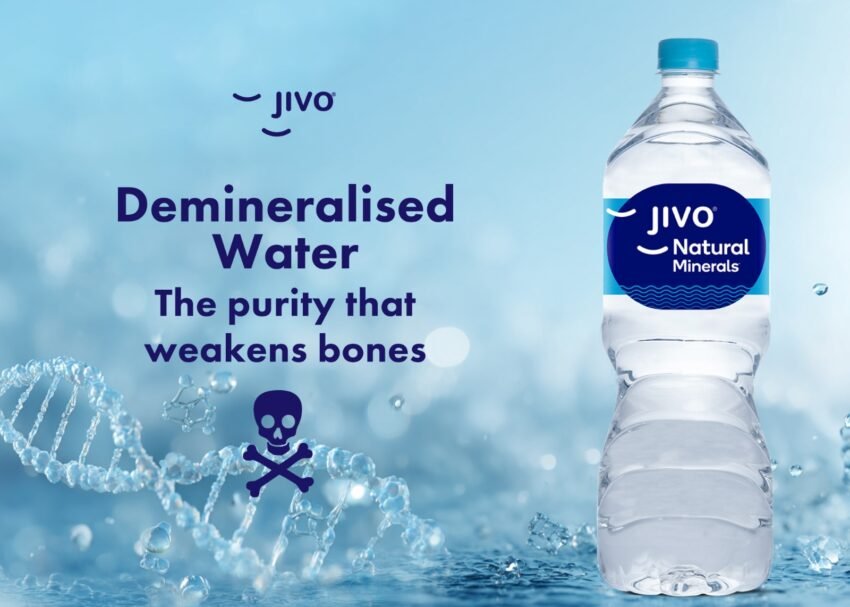Many people in India rely on purified water for daily drinking. However, some types of purification remove important elements from water. This can lead to health issues over time, especially for bones. Demineralised water is one such type that lacks essential minerals. Studies show a connection between drinking this water regularly and problems like weak bones or fractures. In this blog, we will explore what Demineralised water is, how it affects bone health, and why choosing water with natural minerals is better. We will also look at options available in India to help you make informed choices for your family’s bone health by choosing the best mineral water.
What is Demineralised Water?
Demineralised water goes through a process that removes minerals and salts. Common methods include reverse osmosis or distillation. These techniques are popular in homes and offices across India because they clean out impurities like dirt, chemicals, and bacteria. The result is clear, tasteless water that seems pure. But this purity comes at a cost. Natural water from rivers, lakes, or underground sources contains minerals like calcium, magnesium, and potassium. These elements are vital for the body. When we drink Demineralised water, we miss out on these nutrients. Over long periods, this can create imbalances. In many Indian households, reverse osmosis systems are installed to deal with hard water or contamination. While these systems help protect families from contaminants, they might also remove the beneficial minerals found in natural water, which are important for long-term health.
How Demineralised Water Impacts Bone Health
When you drink Demineralised water, the body tries to adjust. This water can pull minerals from your system to balance itself. Over time, this leads to a loss of important elements. For bones, this means less calcium and magnesium available for repair and growth. The body might start breaking down bone tissue to get these minerals, causing weakness. Low mineral intake from water has been linked to higher risks of fractures, especially in kids. In adults, it can speed up bone loss, making conditions like arthritis worse. Demineralised water is often acidic, which adds to the problem by increasing acid levels in the body. Bones act as a buffer, releasing minerals to neutralize acids, but this wears them down. Switching to water that retains natural minerals can help avoid these issues.
Key Minerals for Strong Bones
Bones are living tissues that need constant care. Calcium is the main building block for bones, mainly for skeleton mineralization. Calcium keeps bone dense and strong. Magnesium works with calcium to support bone structure and prevent fractures. Potassium helps balance acids in the body, which protects bones from weakening. Other minerals like bicarbonate also play a role in maintaining bone health. When we consume food, we get some of these minerals, but water is a steady source. Drinking water with these elements ensures the body absorbs them easily. Without enough minerals, bones can lose density, leading to conditions like osteoporosis. This is more common in older adults, but it can start earlier if habits are not right. Children and growing teens need these minerals the most for proper bone development.
Evidence from Research
Several studies highlight the risks of low mineral water. One report from the National Center for Biotechnology Information notes that soft water, low in calcium, raises fracture risks in children. Another study in Frontiers in Nutrition connects plain water intake without minerals to osteoporosis. Osteoporosis makes bones fragile and prone to breaks. Research also shows that long term use of Demineralised water can lead to osteopenia, an early stage of bone loss. In contrast, drinking natural mineral water supports bone remodelling and strength. A study on young rats found that mineral rich water improved bone health compared to Demineralised types. These findings are relevant for India, where many people use purified water daily. Experts recommend checking water sources to ensure they provide essential minerals.
Bone Health Challenges in India
India faces unique water issues due to population and pollution. Many areas have contaminated groundwater, leading to widespread use of purification systems. Reverse osmosis is common in cities like Delhi, Mumbai, and Bangalore. While it removes harmful substances, it also eliminates beneficial minerals. Bone problems are rising in the country. According to health surveys, osteoporosis affects millions, especially women after menopause. Poor diet and lack of exercise add to this, but water quality plays a part. Rural areas might have hard water with excess minerals, but urban homes often over purify. Children in schools and homes drink this water, which could affect their growth. Awareness is growing, and doctors advise adding mineral supplements or choosing better water options. Natural sources like springs provide the best natural mineral water, rich in elements the body needs.
Benefits of Switching to Mineral Water
Mineral water comes from protected underground sources and contains natural elements. It tastes better and supports overall health. For bones, it supplies calcium and magnesium directly. Regular consumption can help maintain bone density and reduce fracture risks. In India, bottled mineral water is convenient and safe. Look for brands that source from clean areas without adding artificial minerals. This ensures authenticity. Drinking mineral water also aids digestion and hydration. It is a simple change that brings long term benefits. Families can keep a mineral water bottle at home for daily use. This habit promotes stronger bones and better energy levels. But make sure, you have the best natural mineral water in your home.
Why Natural Minerals Matter More
Artificial minerals added to water are not as effective as natural ones. The body absorbs natural forms better. Demineralised water lacks this advantage, leading to potential deficiencies. In hot climates like India, we lose minerals through sweat, so replenishing them is key. Natural mineral water provides a balanced mix without extras. It supports not just bones but also heart and muscle function. Studies show that regions with hard water have lower rates of bone issues. Soft, Demineralised water correlates with higher problems. Making the switch can prevent these risks. Keep a mineral water bottle handy during travel or work. Among the top mineral water brands India, choose ones with transparent sourcing. This ensures you get the best mineral water in India for your needs.
Health Tips for Better Bone Strength
Beyond water, diet plays a role. Eat dairy, greens, and nuts for extra minerals. Exercise like walking or yoga builds bone density. Avoid excessive caffeine or soda, as they can leach minerals. Regular check ups help spot issues early. For families, teach kids the value of mineral rich water. In schools, promote using a mineral water bottle instead of taps. These steps combined with choosing popular mineral water brands India can make a difference. Look for the best natural mineral water to support daily hydration.
Read: Essential Tips before Choosing the Best Mineral Water in India
Jivo Natural Mineral Water
Jivo Natural Mineral Water is one of the leading mineral water brands in India, known for its purity and natural composition. Sourced from underground aquifers, it contains essential minerals like calcium, magnesium, and potassium without any artificial additions. The brand focuses on sustainability, using eco-friendly packaging and ensuring the water remains untouched by pollutants. Jivo stands out for its commitment to quality, making it a trusted choice for health-conscious consumers across the country.
- Natural sourcing from protected underground reserves.
- Rich in vital minerals for bone and overall health.
- Available in various sizes, including convenient 1L, 500ml, and 250ml bottles.
- pH balanced for easy absorption and better hydration.
- Free from impurities, with no added chemicals or minerals.
- Supports eco-friendly practices with recyclable packaging.
FAQs
What is Demineralised water and how does it affect bone health?
Demineralised water is purified water stripped of essential minerals like calcium and magnesium through methods such as reverse osmosis. Regular consumption can lead to mineral deficiencies that weaken bones and increase risks of fractures and osteoporosis.
Why is calcium in drinking water important for strong bones?
Calcium from mineral water plays a crucial role in maintaining bone density and strength. It is more easily absorbed from water compared to food sources, helping prevent bone diseases like osteoporosis.
Can drinking low mineral water increase fracture risks in children?
Yes, studies show children consuming soft water low in calcium and magnesium have a higher risk of bone fractures due to impaired bone development and mineral imbalance.
How does magnesium in mineral water support bone health?
Magnesium works with calcium to support bone structure and prevent fractures. It also helps regulate hormones essential for calcium absorption and bone remodelling.
Is natural mineral water better than RO water for bone health?
Natural mineral water retains vital minerals like calcium, magnesium, and potassium that support bone health, whereas RO water often lacks these minerals, potentially leading to bone weakening over time.
Conclusion
Choosing the right natural mineral water is key to preventing bone problems caused by consumption of Demineralised water. Opt for natural mineral water to keep your bones strong and healthy. Always check labels before buying mineral water, and it is best to research before impulsively picking any brand. You can try Jivo’s Natural Mineral Water, a trusted water brand in India known for sourcing water from natural underground wells. Whether for pure hydration or bone health, Jivo is a brand you can always trust.


3 thoughts on “Bone Problems Linked to Demineralised Water Consumption”